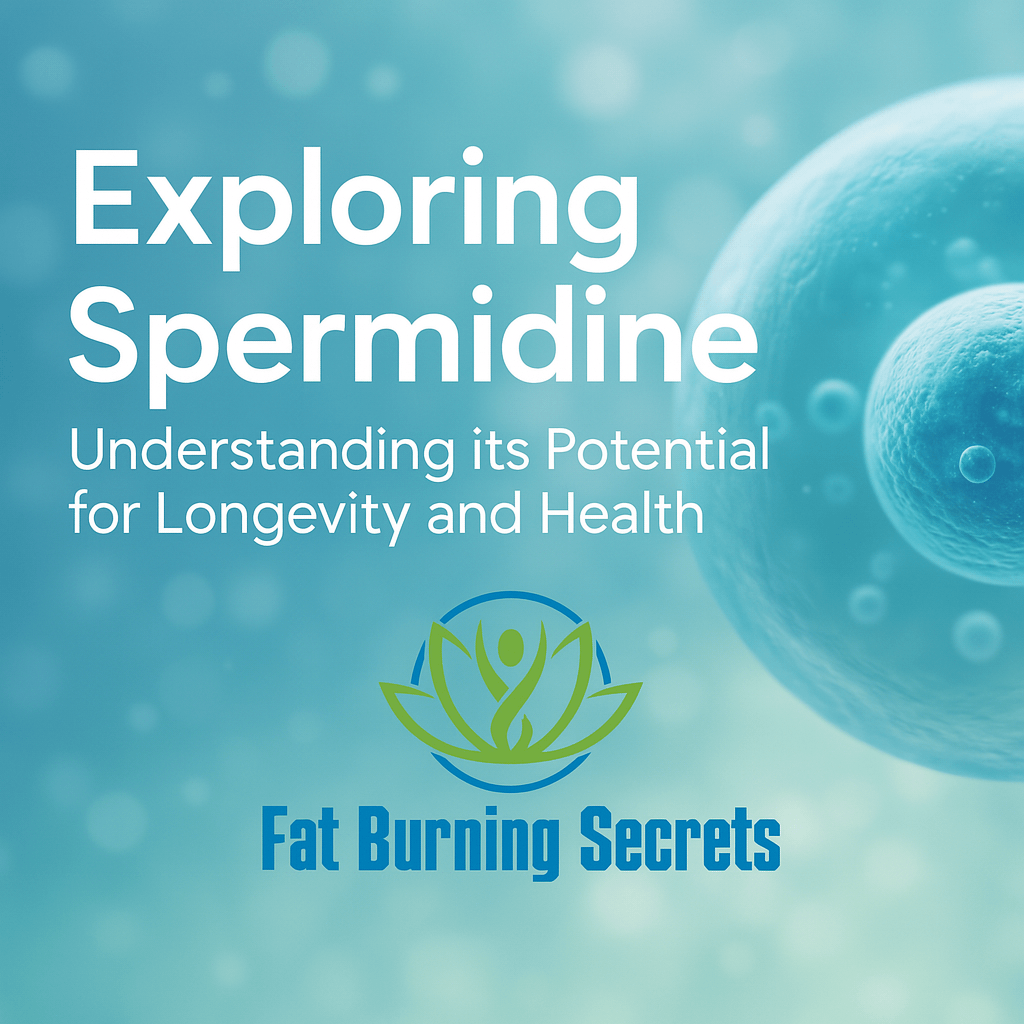
What is Spermidine? The Unsung Hero of Longevity Science
In the ever-evolving world of health and wellness, new buzzwords and miracle compounds seem to pop up almost daily. Yet, some of the most powerful allies in our quest for longevity are hiding in plain sight, quietly working behind the scenes in our own bodies. One such compound is spermidine—a naturally occurring polyamine that is rapidly gaining recognition among scientists, health enthusiasts, and anyone interested in living a longer, healthier life. Note: Scientific studies & references listed at the bottom of this article.
While its name might raise a few eyebrows (yes, it was first discovered in semen, hence the moniker), spermidine is anything but a joke. This humble molecule is now at the forefront of longevity research, with studies suggesting it could play a pivotal role in cellular health, aging, and even the prevention of age-related diseases.
Discovering the Essence of Spermidine
Spermidine was first isolated in the late 17th century, but only recently has its importance in human health come to light. It is found naturally in all living organisms—plants, animals, and humans alike. In our bodies, spermidine is involved in a wide array of cellular processes, acting as a sort of molecular multitasker.
But what exactly is a polyamine? Polyamines are organic compounds with multiple amino groups, and they are essential for cell growth, differentiation, and survival. Spermidine, along with its relatives putrescine and spermine, helps regulate cell proliferation, gene expression, and the stability of DNA and RNA. In other words, spermidine is fundamental to the very building blocks of life.
Where Can You Find Spermidine?
The good news is that spermidine isn’t just something your body produces—it’s also present in a variety of everyday foods. Some of the richest dietary sources include:
- Aged cheese (like Parmesan and cheddar)
- Mushrooms (especially shiitake and maitake)
- Soy products (such as natto, miso, and tofu)
- Whole grains (wheat germ, bran, and brown rice)
- Legumes (lentils, chickpeas, and green peas)
- Certain fruits and vegetables (broccoli, cauliflower, and mango)
Including these foods in your diet can help support your body’s natural spermidine levels, especially as you age.
Why Should You Care About Spermidine?
So, why all the fuss about spermidine? The answer lies in a process called autophagy which is a term derived from Greek, meaning “self-eating.” Autophagy is the body’s way of cleaning house at the cellular level (read my post on What is Autophagy?). It involves breaking down and recycling damaged or dysfunctional cellular components, making way for new, healthy ones.
Think of autophagy as your body’s internal janitorial service. When it’s running smoothly, your cells stay clean, efficient, and resilient. But as we age, autophagy slows down, leading to the accumulation of cellular “junk” that can contribute to aging and disease.
Spermidine: The Autophagy Activator
Research has shown that spermidine is a potent inducer of autophagy. By boosting this process, spermidine helps your cells stay youthful and functional. In animal studies, supplementation with spermidine has been linked to
- Extended lifespan
- Improved cardiovascular health
- Enhanced cognitive function
- Reduced inflammation
- Lower risk of age-related diseases
While human studies are still in their early stages, the evidence so far is promising. In fact, a large epidemiological study in Europe found that people with higher dietary spermidine intake had a significantly lower risk of cardiovascular disease and overall mortality.
The Benefits of Spermidine: Beyond Just A Cell Cleaner
Spermidine’s benefits extend far beyond autophagy. Here’s a closer look at some of the ways this remarkable molecule supports your health:
1. Cell Growth and Maturation
Spermidine is essential for cell division and growth. It helps regulate the cell cycle, ensuring that new cells are produced efficiently and correctly. This is particularly important for tissues that undergo constant renewal, such as the skin, gut lining, and immune system.
2. Inflammation Control
Chronic inflammation is a major driver of aging and many diseases, including heart disease, diabetes, and cancer. Spermidine has been shown to modulate inflammatory pathways, helping to keep inflammation in check and protect against tissue damage.
3. Memory and Cognitive Function
Emerging research suggests that spermidine may support brain health and cognitive function. In animal models, spermidine supplementation has been linked to improved memory, learning, and even protection against neurodegenerative diseases like Alzheimer’s.
4. Heart Health
Cardiovascular disease remains the leading cause of death worldwide. Spermidine appears to support heart health by promoting autophagy in heart cells, reducing blood pressure, and improving arterial elasticity. Some studies have even found that higher spermidine intake is associated with a lower risk of heart failure.
5. Longevity
Perhaps the most exciting benefit of spermidine is its potential to extend lifespan. In laboratory studies, animals given spermidine lived longer, healthier lives, with fewer signs of age-related decline. While more research is needed in humans, these findings have sparked tremendous interest in spermidine as a longevity-promoting compound.
How to Boost Your Spermidine Levels
Given its many potential benefits, you might be wondering how to increase your spermidine intake. Here are some practical tips:
1. Eat a Spermidine-Rich Diet
Focus on whole, plant-based foods like whole grains, legumes, mushrooms, and fermented soy products. Aged cheeses can also be a good source, but should be consumed in moderation due to their high fat and salt content.
2. Consider Supplementation
Spermidine supplements are now available, often derived from wheat germ extract. While these supplements may help compensate for age-related declines in spermidine production, it’s important to choose high-quality products and consult with a healthcare professional before starting any new supplement regimen.

Above are a few spermidine supplements. I purchased the first one and have started taking. I’ll report back in a week. Click the graphic above to explore these supplements on Amazon.
3. Adopt Healthy Lifestyle Habits
Regular exercise, adequate sleep, and stress management can all support healthy autophagy and overall cellular health, working synergistically with spermidine to promote longevity.
Advertisement
Fat Burning Secrets: Efficiency in Fitness – Third Edition ebook
If you’re struggling to lose weight, or just can’t seem to get rid of that stubborn body fat, then consider the Fat Burning Secrets plan. This 4-week guide offers step-by-step instructions for making lifestyle changes that will transform your body into a fat burning machine.
FAQs
1. Are there any side effects of taking spermidine supplements?
Spermidine is generally considered safe when consumed through food. Supplements, however, are relatively new, and long-term safety data in humans is limited. Some people may experience mild digestive upset. As with any supplement, it’s best to consult with a healthcare professional, especially if you have underlying health conditions or are taking medications.
2. What foods are rich in spermidine?
Top spermidine-rich foods include aged cheese, mushrooms, soy products (like natto and miso), whole grains, legumes, and certain fruits and vegetables. Incorporating a variety of these foods into your diet can help maintain healthy spermidine levels.
3. Can I boost my spermidine levels naturally?
Absolutely! Eating a diet rich in spermidine-containing foods, staying physically active, and maintaining a healthy lifestyle can all help support your body’s natural production and utilization of spermidine.
4. Is spermidine suitable for everyone?
While spermidine is a natural compound found in many foods, supplementation may not be suitable for everyone. Pregnant or breastfeeding women, children, and individuals with certain medical conditions should consult their doctor before taking spermidine supplements.
5. How soon can I expect to see benefits from spermidine?
Because spermidine works at the cellular level, its effects may be subtle and gradual. Most research suggests that long-term, consistent intake—either through diet or supplementation—is key to experiencing its full benefits.
Summary
Spermidine, once an obscure molecule with a quirky name, is now recognized as a key player in the science of healthy aging and longevity. Its role in promoting autophagy, supporting cellular health, and potentially extending lifespan makes it a compound worth paying attention to. While research is ongoing, the evidence so far is compelling: by incorporating spermidine-rich foods into your diet and considering supplementation under professional guidance, you can take proactive steps toward a longer, healthier life.
Key Takeaways
- Spermidine is a naturally occurring compound essential for cellular cleanup and health.
- It’s found in various foods, including aged cheese, mushrooms, soy products, and whole grains.
- Spermidine supports autophagy, inflammation control, heart health, and cognitive function.
- Supplements may help offset age-related declines, but should be used with caution and professional advice.
- A healthy lifestyle amplifies spermidine’s benefits for longevity and well-being.
References & Additional Reading
- Eisenberg, T., Knauer, H., Schauer, A., et al. (2009). Induction of autophagy by spermidine promotes longevity. Nature Cell Biology, 11(11), 1305–1314. Read the study
- Madeo, F., Eisenberg, T., Pietrocola, F., & Kroemer, G. (2018). Spermidine in health and disease. Science, 359(6374), eaan2788. Read the review
- Schwarz, C., Stekovic, S., Wirth, M., et al. (2018). Safety and tolerability of spermidine supplementation in mice and older adults with subjective cognitive decline. Aging (Albany NY), 10(1), 19–33. Read the study
- Wirth, M., Schwarz, C., Benson, G., et al. (2019). Effects of spermidine supplementation on cognition and biomarkers in older adults with subjective cognitive decline (SmartAge)—study protocol for a randomized controlled trial. Alzheimer’s Research & Therapy, 11, 36. Read the protocol
- Richard H. Webb: Learn how auto suggestion can improve your mental fitness.
- Richard H. Webb: What is Autophagy?
We invite you to explore further, ask questions, and engage in your journey towards longevity.




2 Responses
Great article, Richard. I’ve been hearing a lot about spermidine lately, but this is the first time I’ve seen it explained in such a clear, down-to-earth way. I had no idea it played a role in autophagy and heart health. The food list was super helpful too. Nice to know I’m already eating some of those! Quick question—do you think most people can get enough from food, or is a supplement usually needed? Also, are there any downsides to watch for?
Appreciate you making this complex topic easy to understand.
Thanks so much for the kind words, Joseph—I really appreciate it! I’m glad the article helped clarify things. Spermidine is definitely gaining attention for good reason, especially with its connection to autophagy, cellular health, and longevity.
To your questions:
Can you get enough from food?
In theory, yes—if your diet includes plenty of spermidine-rich foods like wheat germ, aged cheese, soy products, and mushrooms, you may be getting a helpful amount. But studies suggest that as we age, our body’s production and absorption may decline, which is where supplementation can help fill the gap, especially if you’re looking for therapeutic levels.
Any downsides to watch for?
While spermidine is naturally found in many foods and generally considered safe, high-dose supplements haven’t been studied long-term in humans. Some mild side effects like digestive upset have been reported, and it’s always smart to talk to a healthcare provider before starting any supplement—especially if someone has a medical condition or takes medications.
As I said in the post, I just started taking a supplement and as of today I’m on the 3rd day. I’ll report back with my results in a week or two. Stay tuned!
Thanks again for reading and engaging—comments like yours keep the conversation going!